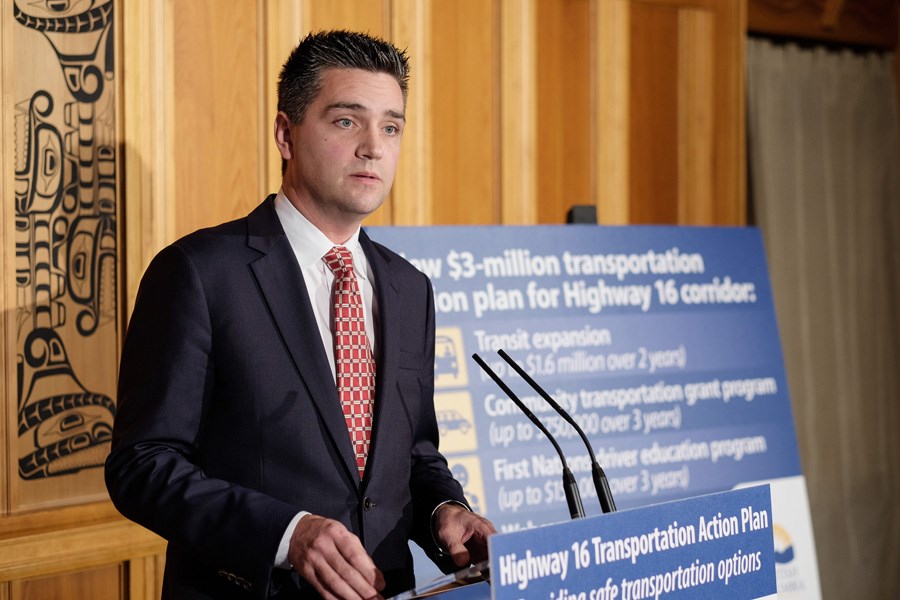The B.C. government unveiled a $3-million plan to improve safety along the so-called Highway of Tears between Prince George and Prince Rupert on Monday.
The funding is broken down into four commitments, the largest being $1.6 million over two years to expand transit along the 750-km stretch.
Details are still to be worked out, but Transportation Minister Todd Stone suggested it will fund three different routes: Burns Lake-Houston-Telkwa-Smithers, Hazelton-Gitsegukla-Kitwanga-Terrace and Burns Lake-Fraser Lake-Vanderhoof-Prince George.
The money would be spent on a cost-sharing basis, with B.C. Transit covering two-thirds and participating communities the remaining one-third. Stone said that's "exceptionally generous" when compared to the more typical arrangement that sees communities cover 45 per cent.
In addition, $750,000 over three years will be earmarked for a grant program to purchase and operate vehicles; $150,000 over three years for a First Nations driver education program; and $500,000 over two years for safety improvements, including webcams and transit shelters.
The plan, unveiled in Victoria three weeks after a symposium on the issue was held in Smithers, also calls for an effort to better synchronize schedules and expand user eligibility criteria for existing services.
Details on how the plan will be implemented will be worked out over the next couple months with the help of a nine-person advisory committee that includes Carrier Sekani Family Services executive director Mary Teegee.
Teegee called the announcement a "start" and noted the idea of providing a shuttle service along Highway 16 West was first raised in 2006 in a final report from a previous symposium held in Prince George. It was echoed six years later in the final report from Missing Women Inquiry commissioner Wally Oppal.
"It's been 10 years where very little has been done so I'm hopeful that this is a beginning," Teegee said.
It also remains a far cry from a full-fledged transit system along Highway 16 in Teegee's view.
"It's not just First Nations people who should be up in arms," Teegee said. "It should be every resident in northern B.C. because it's [about] your right and access to services."
Stone reiterated the provincial government's position that the idea is a nonstarter.
"Many have called for more simplistic solutions – a bus running from one end of the corridor to the other – that is simply not practical," Stone said.
"We were hearing consistently [during the Smithers symposium] from folks along the corridor that what they really need, what they really wanted to see were solutions that were tailored to the needs of their specific community."
He referred to a service operated by the Nak'azdli First Nation in Fort St. James that transports about five people a day, five days a week, to Vanderhoof for medical appointments. Stone said it's used by First Nations and non-First Nations alike and is coordinated by Nak'azdli with "tremendous support by the local government and the regional district."
"That's a solution that is working very, very well for the communities," Stone said.
He said the time taken was "needed to go through this rigorous process" and now expects to see the various actions "either fully in place or well their way" by April.
Funding of $75,000 per year to Carrier Sekani Family Services for the Highway of Tears Initiative will also run out at the end of this year. "Amazing things" have been done through the initiative, Teegee said, such as developing a community safety took kit, first responders training and support for victims during the Cody Legebokoff trial.
Teegee is hoping to get funding through the province's civil forfeiture proceeds to keep the program running.



